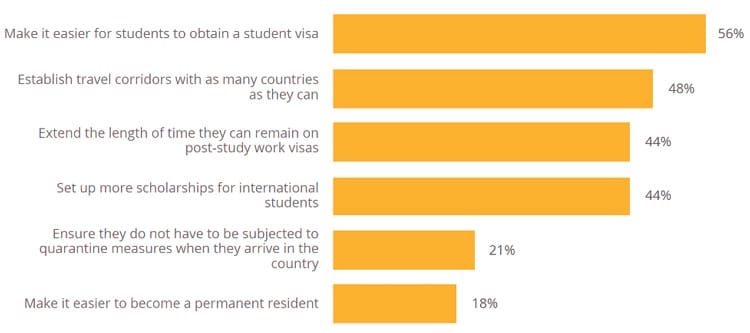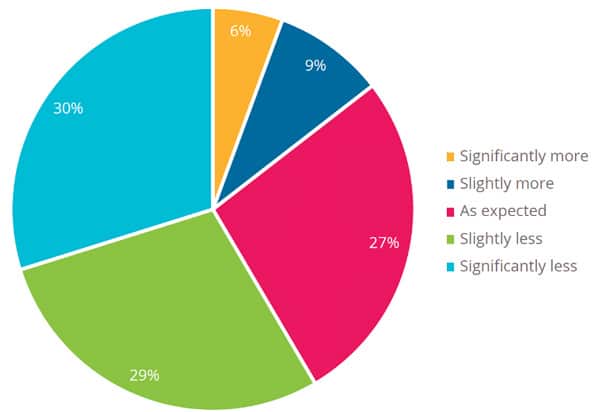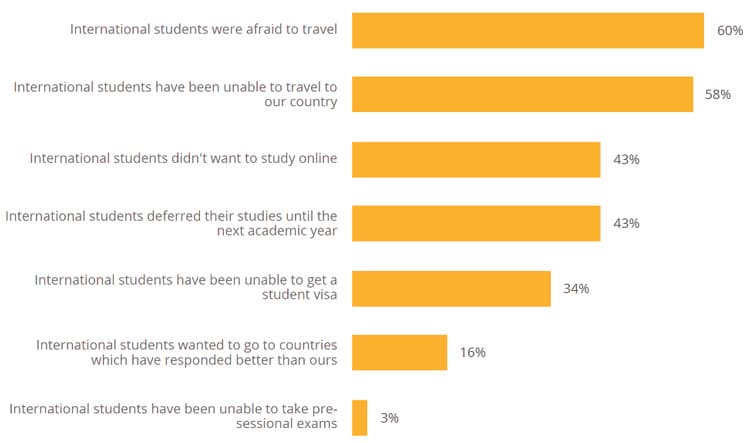Survey respondents optimistic about international student recruitment in 2021
- A survey of university-respondents in 61 countries finds more are optimistic than pessimistic about recruitment in 2021
- Asked what they would like their government to prioritise, most said that they would like to see it become easier for students to obtain study visas
- Though the majority of respondents reported lower-than-expected student intakes in 2020, a significant proportion said that their recruitment efforts yielded the same enrolments and some even reported better than expected results
The latest in a QS survey series begun in 2020 finds that there is a sense of cautious optimism regarding student recruitment prospects in 2021. The new report, Hope for the Future: How Universities Are Identifying Emerging Opportunities in 2021, surveyed 425 respondents working at universities in 61 countries.
Market diversification a goal for many
Almost half (45%) of respondents said they feel optimistic about the year ahead, while 29% are neutral. At the same time, more than a quarter of educators are pessimistic (27%).
Asked whether they were aiming to diversify their source markets, 51% said they were. Another 38% weren’t sure or were in the consideration phase. Only 11% were not interested in becoming active in a more diverse set of countries.
How governments could help
More than half of respondents (56%) said that they would like to see their government make it easier for students to obtain a study visa. Strong proportions also felt the following measures would be helpful to their efforts to recruit international students: establishing study travel corridors with multiple countries, extending the amount of time students can remain in the country on post-study work visas, and setting up more scholarships for international students.

Most recent intake lower than expected
Close to 6 in 10 educators said that they enrolled fewer students than expected in their most recent intake; 30% said their intake was significantly lower and another 27% said it was slightly lower. About a quarter said their recruitment went as expected, and a small proportion (15%) said that it produced better results than expected.

QS notes that the results point to resiliency in the market: “Given the widespread and devastating nature of the coronavirus crisis, the fact that 27% of respondents saw their expected levels of recruitment, and a combined 15% saw more than expected, is a promising indication of the strength of the international student market.”
Educators who did not achieve the recruitment targets they expected pointed to a number of factors for why students did not enrol, with COVID-related fears and travel restrictions the top reasons cited.

Few prospects lost to other countries
Only 16% of educators said that their intake had been affected by a trend of prospects choosing another country to study in because that country was perceived to have dealt with the COVID crisis better. Of that 16%, however, more than 4 in 10 estimated they had lost upwards of 50% of their prospects to other countries. Twenty-six percent thought they might have lost more than 70% of their prospects this way.
Measures used to boost enrolments
Understandably, many educators have been facing the recruitment challenges presented by traditional language exams being cancelled due to COVID restrictions as well as students facing more financial hardship and travel restrictions in the pandemic. So far, 18% said they have admitted international students without test scores, and a quarter had offered tuition discounts to students who have remained in their home countries to study.
Going forward into 2021, 29% of educators said they are thinking of offering tuition discounts to students who have to start their programmes online, lower than the 44% who indicate they are not considering this incentive.
For additional background please see:
















